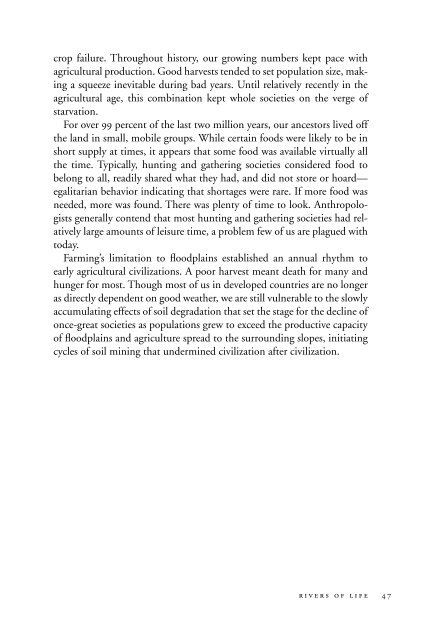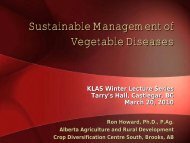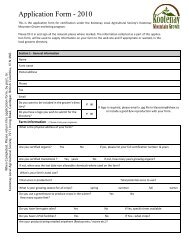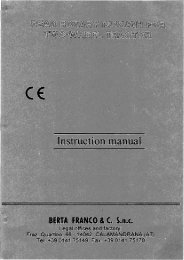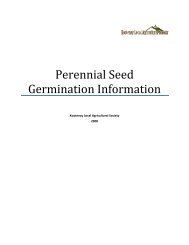- Page 2 and 3:
Dirt
- Page 4 and 5:
Dirt the erosion of civilizations D
- Page 6:
For Xena T. Dog, enthusiastic field
- Page 10: acknowledgments This book could nev
- Page 13 and 14: 2 Yet what is dirt? We try to keep
- Page 15 and 16: 4 discovered ways to enhance soil f
- Page 17 and 18: 6 quent centuries, nutrient depleti
- Page 20 and 21: two Skin of the Earth We know more
- Page 22 and 23: villa in Gloucestershire lay undete
- Page 24 and 25: When we behold a wide, turf-covered
- Page 26 and 27: Soil not only helps shape the land,
- Page 28 and 29: ter and mineral soil. Billions of m
- Page 30 and 31: Topography also affects the soil. T
- Page 32 and 33: Wind can pick up and erode dry soil
- Page 34 and 35: Combinations of soil horizons, thei
- Page 36: much. This leaves the issue in a po
- Page 39 and 40: 28 Ice Age was not a single event.
- Page 41 and 42: 30 For much of the last century, th
- Page 43 and 44: 32 Abu Hureyra sat on a low promont
- Page 45 and 46: 34 wheat dating from 10,000 years a
- Page 47 and 48: 36 Domesticated livestock not only
- Page 49 and 50: 38 inated the southern Mesopotamian
- Page 51 and 52: 40 of a high load of dissolved salt
- Page 53 and 54: 42 direct water to particular place
- Page 55 and 56: 44 by the color of dirt eroded from
- Page 57: 46 out the region, he concluded tha
- Page 61 and 62: 50 Although societies dating back t
- Page 63 and 64: 52 N E P I R U S IONIAN SEA 0 150 k
- Page 65 and 66: 54 Valley bottom sediments of the A
- Page 67 and 68: 56 ancient dams, cisterns, and ruin
- Page 69 and 70: 58 Republic was founded in 508 bc.
- Page 71 and 72: 60 Falling slave and grain prices b
- Page 73 and 74: 62 Some contemporary accounts suppo
- Page 75 and 76: 64 directly in commerce, many wealt
- Page 77 and 78: 66 spread erosion on slopes beyond
- Page 79 and 80: 68 of the Nile fed Rome. Soil erosi
- Page 81 and 82: 70 Figure 9. Ruins of the first cen
- Page 83 and 84: 72 cut primarily for timber or farm
- Page 85 and 86: 74 Mayan civilization provides the
- Page 87 and 88: 76 had filled with soils eroded aft
- Page 89 and 90: 78 slope soils around 700 bc coinci
- Page 91 and 92: 80 throughout the Southwest. Agricu
- Page 94 and 95: five Let Them Eat Colonies There is
- Page 96 and 97: As agriculture spread north and wes
- Page 98 and 99: agricultural land lies on valley-bo
- Page 100 and 101: Italy’s soil faltered. Mussolini
- Page 102 and 103: ing land in pasture restored soil f
- Page 104 and 105: ecause the Church seldom relinquish
- Page 106 and 107: Soil husbandry began to be seen as
- Page 108 and 109:
Figure 11. Title page to The Whole
- Page 110 and 111:
the introduction of clover and othe
- Page 112 and 113:
Figure 12. Mid-eighteenth-century a
- Page 114 and 115:
While Surell fretted about how to r
- Page 116 and 117:
Figure 13. French farmers loading s
- Page 118 and 119:
food production and food demand as
- Page 120 and 121:
meat. With most of the country’s
- Page 122 and 123:
the fear of famine. The chairman’
- Page 124:
ticed conventional and so-called su
- Page 127 and 128:
116 eating into the ancient uplands
- Page 129 and 130:
118 Historian Avery Craven saw colo
- Page 131 and 132:
120 another £50,000 from Maryland
- Page 133 and 134:
122 Essays on Field Husbandry, and
- Page 135 and 136:
124 tobacco for wearing out the lan
- Page 137 and 138:
126 Our country is hilly and we hav
- Page 139 and 140:
128 Although it was known that a we
- Page 141 and 142:
130 Seeing secession as the only op
- Page 143 and 144:
132 mation implied a fundamental ch
- Page 145 and 146:
134 There can be no doubt that the
- Page 147 and 148:
136 As is often the case, insight c
- Page 149 and 150:
138 ALABAMA > 10 inches 4-10 inches
- Page 151 and 152:
140 Maryland’s colonial ports of
- Page 153 and 154:
142 Figure 17. Eroded land on tenan
- Page 155 and 156:
144 villages in the jungle of north
- Page 157 and 158:
146 Grazed by buffalo for at least
- Page 159 and 160:
148 The late nineteenth-century adv
- Page 161 and 162:
150 amount formed and that removed.
- Page 163 and 164:
152 each person in the city. The ne
- Page 165 and 166:
154 Figure 20. Buried machinery in
- Page 167 and 168:
156 Bennett calculated that it took
- Page 169 and 170:
158 conservation, crop diversificat
- Page 171 and 172:
160 As crop yields increased two- t
- Page 173 and 174:
162 Figure 22. Bare, rilled field i
- Page 175 and 176:
164 With the ground left bare durin
- Page 177 and 178:
166 than one hundred days in northe
- Page 179 and 180:
168 Soil erosion rates from West Af
- Page 181 and 182:
170 number political refugees, are
- Page 183 and 184:
172 Enough American farms disappear
- Page 185 and 186:
174 Designated the nation’s first
- Page 187 and 188:
176 resource economists downplay th
- Page 190 and 191:
eight Dirty Business A nation that
- Page 192 and 193:
A phenomenally successful adaptatio
- Page 194 and 195:
On a more optimistic note—as we p
- Page 196 and 197:
alternative farming—even as the s
- Page 198 and 199:
effect on crop yields. Widespread a
- Page 200 and 201:
Seeking out virgin soils, Hilgard s
- Page 202 and 203:
in sodium sulfate and sodium carbon
- Page 204 and 205:
e the key elements of concern to ag
- Page 206 and 207:
than half of America’s farmers ha
- Page 208 and 209:
Ammonia plant construction began ag
- Page 210 and 211:
tion. The number of hungry Chinese
- Page 212 and 213:
experiments at Rothamsted from 1843
- Page 214 and 215:
Howard’s methods in the tropics w
- Page 216 and 217:
that portion now being farmed. ...T
- Page 218 and 219:
pests, provide all its own nitrogen
- Page 220 and 221:
soil. In contrast, the conventional
- Page 222 and 223:
mulching, which can triple the mass
- Page 224 and 225:
organic matter content of the top f
- Page 226 and 227:
ended in 1995 when the company agre
- Page 228 and 229:
nine Islands in Time When our soils
- Page 230 and 231:
When asked how the great stone stat
- Page 232 and 233:
I doubt the Easter Islanders had an
- Page 234 and 235:
comparable populations at the time
- Page 236 and 237:
irch forest that covered thousands
- Page 238 and 239:
Figure 25. Professor Ulf Helldén s
- Page 240 and 241:
Soil loss from the uplands in the r
- Page 242 and 243:
Soviet collapse, Cuba began privati
- Page 244 and 245:
ten Life Span of Civilizations Spea
- Page 246 and 247:
enefits of soil conservation can be
- Page 248 and 249:
thirty to seventy generations. Thro
- Page 250 and 251:
lion people and 1.5 billion hectare
- Page 252 and 253:
difference between good farming and
- Page 254 and 255:
Emerging interest in supporting an
- Page 256 and 257:
ottom line is that we have to adapt
- Page 258 and 259:
1. Darwin 1881, 4. 2. Darwin 1881,
- Page 260 and 261:
14. Washington 1803, 103-4. 15. Jef
- Page 262 and 263:
ibliography 1. good old dirt Hooke,
- Page 264 and 265:
Pringle, H. 1998. Neolithic agricul
- Page 266 and 267:
Hughes, J. D. 1975. Ecology in Anci
- Page 268 and 269:
Landforms and Landform Evolution in
- Page 270 and 271:
Surell, A. 1870. A Study of the Tor
- Page 272 and 273:
Pasternack, G. B., G. S. Brush, and
- Page 274 and 275:
Lal, R. 1993. Soil erosion and cons
- Page 276 and 277:
8. dirty business Appenzeller, T. 2
- Page 278 and 279:
Pimentel, D., P. Hepperly, J. Hanso
- Page 280 and 281:
Environmental Problems in Microcosm
- Page 282 and 283:
abandonment of land: American agric
- Page 284 and 285:
iodiversity, 206-7, 220, 244 Black
- Page 286 and 287:
Saharan Africa, 165-68. See also de
- Page 288 and 289:
guanine, 15 guano: commercial ferti
- Page 290 and 291:
75, 76. See also sloping land, eros
- Page 292 and 293:
and, 30, 34-35, 36-37, 42, 47; rela
- Page 294 and 295:
192-95, 202, 205; prairie lands and
- Page 296 and 297:
Soil Management, 192; estimates of


